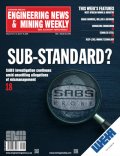PwC says economic impact of Covid-19 warrants interest rate cut
The South African Reserve Bank’s (SARB’s) Monetary Policy Committee (MPC) has started gathering for its bi-monthly meeting from March 17 to 19.
This after the MPC was pressured to meet earlier at the beginning of March, owing to the fallout from the coronavirus outbreak. At the time, SARB governor Lesetja Kganyago said it was not necessary to call an emergency meeting.
The central bank has been assessing how the situation will impact on the South African economy and, based on this assessment, take appropriate action at its next meeting.
Before the Covid-19 panic, there were already expectations that the central bank could lower interest rates further in 2020. The MPC announced at its previous meetings in January that a 0.25 percentage point cut in interest rates was necessary, on the back of significant reductions in its inflation forecasts.
The MPC also noted that the implied path of interest rates generated by its quarterly projection model indicated scope for another 25 basis point cut later in the year. This was largely owing to low inflation and also a weak economic climate.
The SARB’s inflation outlook was “quite favourable” in January, said professional services firm PwC in a release on Tuesday.
PwC reported that the SARB was happy with the moderation in headline inflation toward the middle of the 3% to 6% target range and, subsequently, the bank indicated it expected average inflation of 4.7% and 4.6% in 2020 and 2021, respectively.
PwC cited a survey done by the Bureau for Economic Research (BER), showing that analysts, businesspeople and trade union officials were expecting slightly higher averages for the two years – though their expectations were much lower than the near 6% predictions seen not too long ago.
“Recent developments have seen a large dive in the international oil price, as well as a sharp depreciation in the rand exchange rate. Both were partially influenced by panic around Covid-19 and the impact thereof on the global economy.
“A lower oil price is quickly associated with some fuel price relief for local consumers. The potential benefit on inflation is certainly tempered by a weaker rand – the South African currency’s current level around R16 to the dollar is notably higher than the R14.60 to the dollar seen at the last MPC meeting,” explained PwC.
The SARB will take into account these dynamics when it re-forecasts inflation.
Meanwhile, the MPC in January expected economic growth of 1.2% in 2020, which was before the recession was confirmed.
Further, a long list of downside risks had since materialised, including data confirming a recession, the virus’ impact on international trade, supply chains and consumer demand, a Budget speech that provided no real solutions to the fiscal situation and a weaker exchange rate owing to worries around global growth.
Ratings agency Moody’s Investors Service had cut its growth forecast for this year from 0.7% in mid-February to 0.4%.
PwC was confident that the SARB would also lower its growth forecast for the country soon.
The central bank was due to publish its latest growth projections this week and these numbers were unlikely to be encouraging.
INTEREST RATE SUGGESTION
The professional services firm said that “easier” monetary policy could certainty provide a short-term boost for the South African economy.
This sentiment was agreed by monetary authorities such as the US Federal Reserve, the Bank of Canada, the Reserve Bank of Australia and Bank Indonesia, which had cut lending rates in response to the adverse economic impact of the Covid-19 outbreak.
The SARB stated that a 25 basis points cut in the repo rate could lift gross domestic product growth by 0.1 percentage points over a 12 to 18 month period. “At this stage, that increase in growth prospects will be very welcome,” noted PwC.
PwC believed that, despite no need for an emergency MPC meeting earlier this month, this was an urgent enough situation to warrant an interest rate cut of 50 basis points.
This could even be spread out, PwC said, adding that two 25 basis point cuts in March and May, respectively, would suggest the SARB was not in panic mode.
“Significant monetary policy easing – combined with faster implementation of economic reforms, as indicated in the Budget Review 2020 – is required to boost the South African economy.
“This could add 0.3 percentage points to economic growth over the next 12 months. And there is no risk to the inflation outlook from this suggested stimulus.”
Comments
Announcements
What's On
Subscribe to improve your user experience...
Option 1 (equivalent of R125 a month):
Receive a weekly copy of Creamer Media's Engineering News & Mining Weekly magazine
(print copy for those in South Africa and e-magazine for those outside of South Africa)
Receive daily email newsletters
Access to full search results
Access archive of magazine back copies
Access to Projects in Progress
Access to ONE Research Report of your choice in PDF format
Option 2 (equivalent of R375 a month):
All benefits from Option 1
PLUS
Access to Creamer Media's Research Channel Africa for ALL Research Reports, in PDF format, on various industrial and mining sectors
including Electricity; Water; Energy Transition; Hydrogen; Roads, Rail and Ports; Coal; Gold; Platinum; Battery Metals; etc.
Already a subscriber?
Forgotten your password?
Receive weekly copy of Creamer Media's Engineering News & Mining Weekly magazine (print copy for those in South Africa and e-magazine for those outside of South Africa)
➕
Recieve daily email newsletters
➕
Access to full search results
➕
Access archive of magazine back copies
➕
Access to Projects in Progress
➕
Access to ONE Research Report of your choice in PDF format
RESEARCH CHANNEL AFRICA
R4500 (equivalent of R375 a month)
SUBSCRIBEAll benefits from Option 1
➕
Access to Creamer Media's Research Channel Africa for ALL Research Reports on various industrial and mining sectors, in PDF format, including on:
Electricity
➕
Water
➕
Energy Transition
➕
Hydrogen
➕
Roads, Rail and Ports
➕
Coal
➕
Gold
➕
Platinum
➕
Battery Metals
➕
etc.
Receive all benefits from Option 1 or Option 2 delivered to numerous people at your company
➕
Multiple User names and Passwords for simultaneous log-ins
➕
Intranet integration access to all in your organisation


















